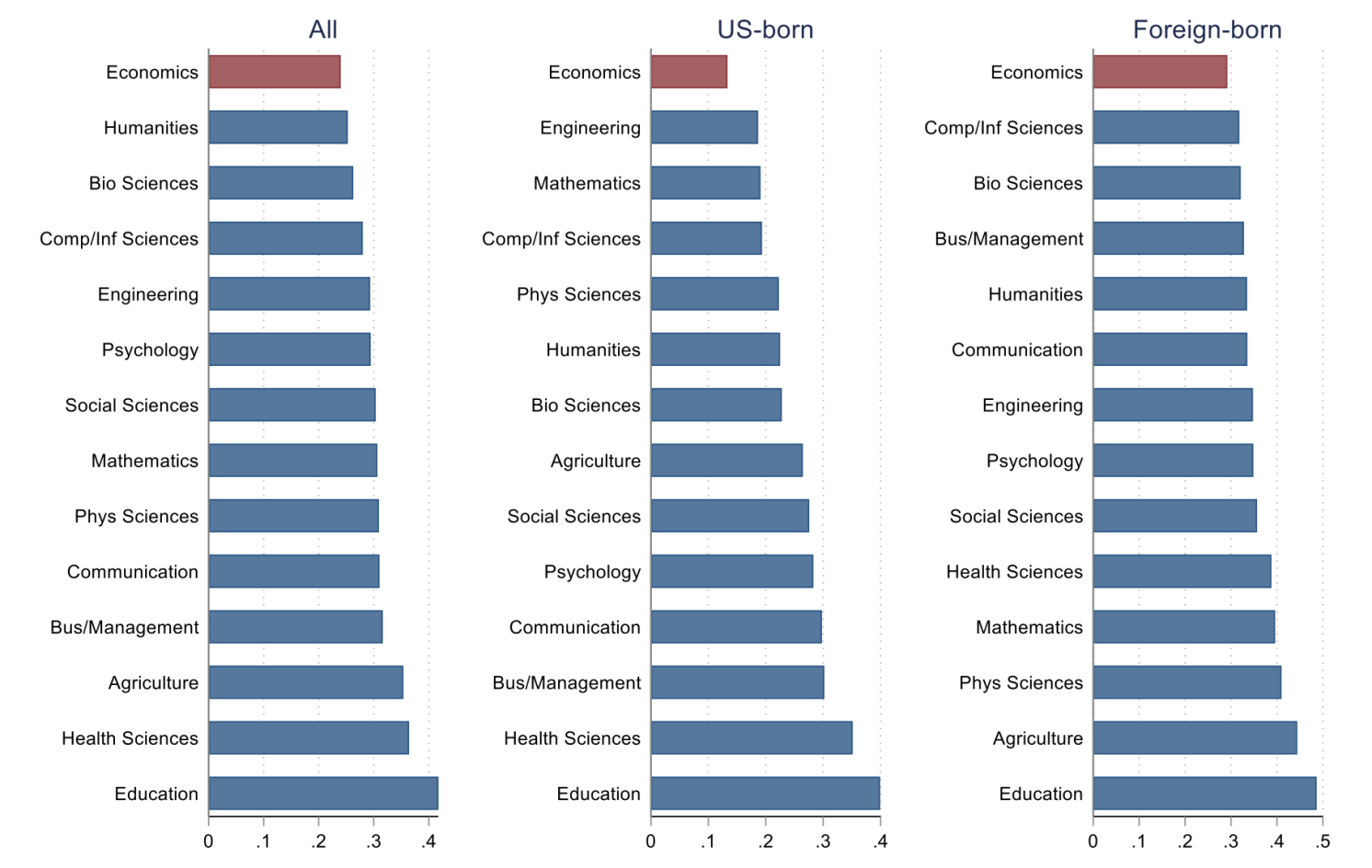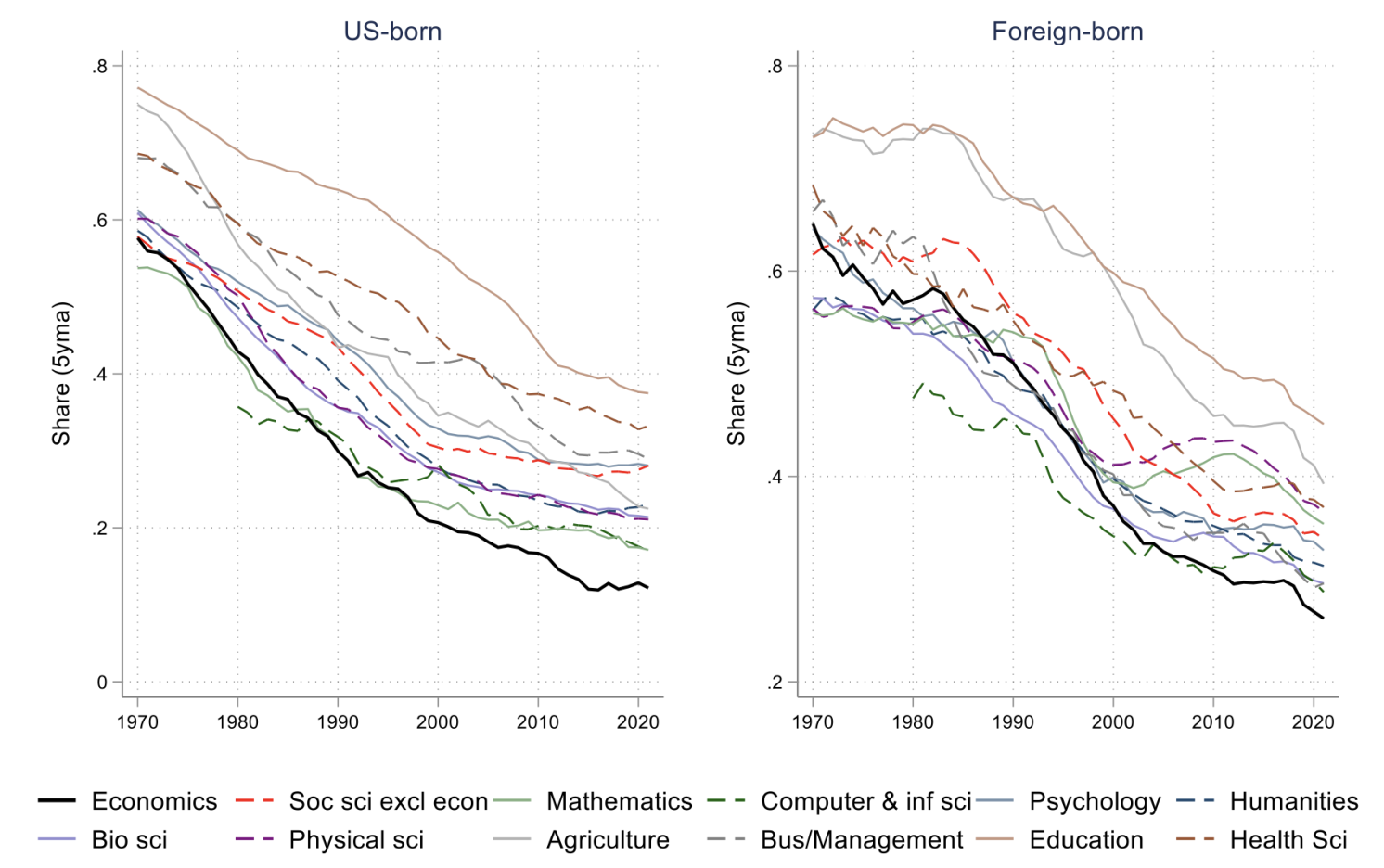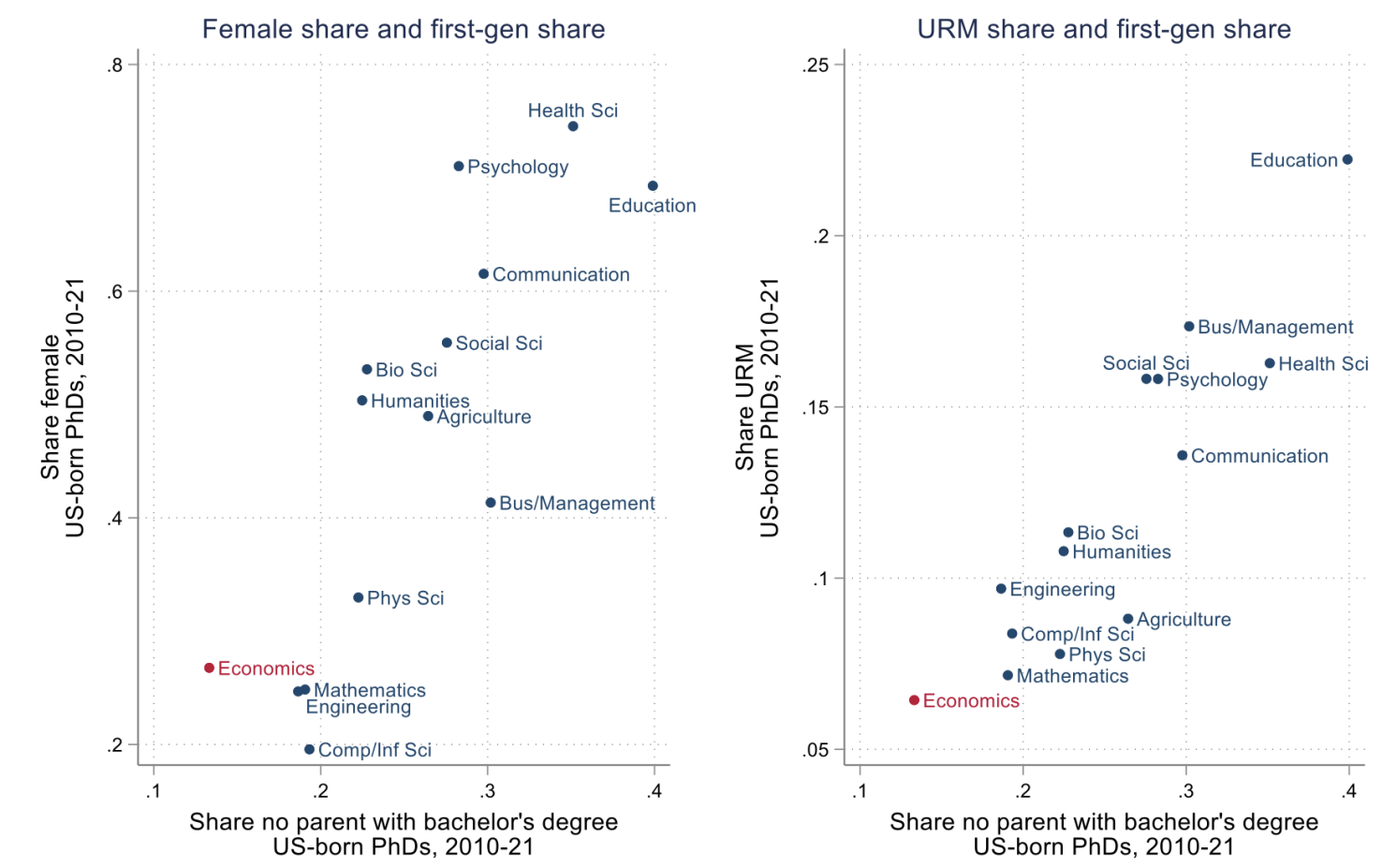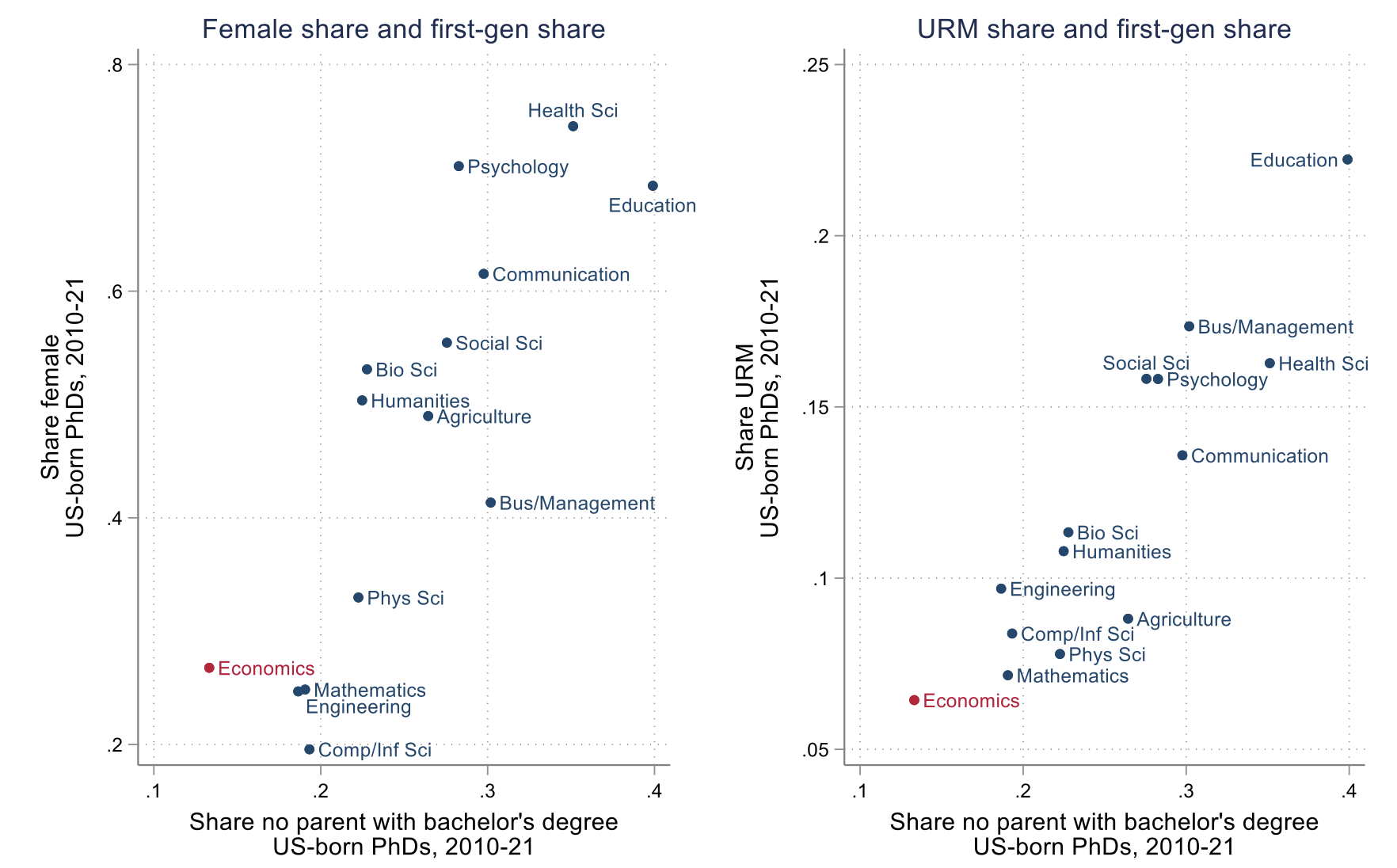Women and racial and ethnic minorities are underrepresented amongst US economics undergraduates, PhDs, and academic faculty relative both to the US population and to many other academic disciplines. This column focuses on socioeconomic diversity, and documents that US economics PhDs have more highly educated parents than PhD recipients in other disciplines and that the lack of socioeconomic diversity in economics, compared to other disciplines, has worsened over time. Underrepresentation is particularly stark for Black and Hispanic students. A lack of socioeconomic diversity can affect the quality, breadth, and depth of the intellectual contributions of the profession.
It is well documented that women and racial and ethnic minorities are underrepresented amongst US economics undergraduates, PhDs, and academic faculty – relative both to the US population and to many other academic disciplines (e.g. Bayer and Rouse 2016, Bayer and Wilcox 2019, Lundberg and Stearns 2019, Wessel et al. 2019, Lundberg 2020, Bayer et al. 2020, Ginther and Kahn 2021). In contrast, almost nothing is known about the socioeconomic background of economists.
In a new paper (Stansbury and Schultz 2023), Robert Schultz and I systematically document that US economics PhDs are from more elite backgrounds on average than PhD students in other disciplines – who, in turn, are substantially more elite than the average US population. In this column, I describe our data and measure of socioeconomic background, lay out our four core stylised facts about economics’ lack of socioeconomic diversity, describe the interplay of socioeconomic diversity, racial/ethnic diversity, and gender diversity, and offer thoughts on possible explanations.
Measuring socioeconomic background
A central reason for the lack of attention to socioeconomic diversity – not just in the economics profession but in workplaces and occupations in general – is that it is often unobservable and rarely measured (e.g. Kniffin 2007, Laurison and Friedman forthcoming). In our new paper, we use data from the National Science Foundation’s Survey of Earned Doctorates, which is an annual census of all individuals who receive US research doctorates. From this survey, we construct our measure of socioeconomic background: the highest level of education attained by either parent.
Parental education is one of the three most commonly used measures of socioeconomic background in academic research, alongside household income and parental occupation, which are not included in the survey (Duncan et al. 1972, Hauser 1994). While parental education is not a perfect or comprehensive measure of the ability of parents to transmit socioeconomic advantage to their children, it is both highly correlated with income (particularly in the US), and even conditional on income, and is a separate channel for the transmission of knowledge or access to resources needed to succeed in higher education (Sirin 2005).
Our core analyses distinguish between three groups: people with no parent with a bachelor’s degree (‘first-generation college grads’); people with at least one parent with a bachelor’s degree but no parent with a graduate degree; and people with at least one parent with a graduate degree (which could be a professional degree, master’s, or doctorate). In our baseline analyses, we focus on people who received their PhDs between 2010 and 2021. We use these data to document four core facts about socioeconomic diversity in economics relative to other fields.
Fact 1: Economics PhD recipients have more highly educated parents than PhD recipients in other disciplines
Economics is substantially less socioeconomically diverse than the average PhD field. Compared with the 14 major PhD fields (as defined by the National Science Foundation, and separating economics from the other social sciences), economics has the lowest share of first-generation college graduates, at 24% (Figure 1), and the second-highest share of people with a parent with a graduate degree, at 48%.
Figure 1 Share of first-generation college graduates, by PhD field and place of birth (2010–21 US PhD recipients)


Note: ‘Social sciences’ excludes economics.
Source: Survey of Earned Doctorates, 2010–21.
Fact 2: The socioeconomic gap between economics and other disciplines is particularly stark for PhD recipients born in the US
US PhD recipients come from many countries, and economics is particularly international, with two-thirds of PhDs born abroad. Parental education may be a different signal of socioeconomic background depending on the country of origin. So, next, we look at parental education separately for the US- and foreign-born.
We find that economics’ lack of socioeconomic diversity is particularly stark among US-born students. Fewer than one in six US-born economics PhDs were first-generation college grads, compared to one in four across all PhD fields. And two-thirds of US-born economics PhDs had a parent with a graduate degree. In fact, when looking across narrowly defined PhD fields, economics stands out as the least socioeconomically diverse of any field, with the smallest share of first-generation college grads and the largest share of PhDs who have a parent with a graduate degree. Strikingly, economics is even less socioeconomically diverse among US-born PhD recipients than art history or classics – two subjects typically thought of as highly elite.
Among foreign-born PhDs, economics is also below average in terms of socioeconomic diversity: it has a smaller share of first-generation college grads than in any of the 14 major PhD fields, and the third-highest share with a parent with a graduate degree, after psychology and the humanities.
Fact 3: Economics’ relative lack of socioeconomic diversity has worsened over time, as compared to other disciplines
Examining parental education shares since 1970 for economics and the 14 major PhD fields illustrates that economics’ socioeconomic diversity problem has gotten worse over time. For all fields, the share of PhDs with no parent with a bachelor’s degree has fallen substantially since 1970, as overall population education levels have increased.
But economics saw steeper changes than other fields. For both US-born and foreign-born PhD recipients, economics was close to the average in its share of first-generation college grads in 1970 but had by far the lowest share of any field by 2021 (Figure 2). For US-born students, this divergence came in two parts: from the 1980s until around 2000, economics, mathematics, and computer science diverged from other PhD fields; and then from around 2000 onwards, economics diverged even from mathematics and computer science.
Figure 2 Share of first-generation college graduates among PhD recipients, 1970–2021


Notes: Five-year centred moving averages. Computer and information sciences are shown only from 1980 because of small sample sizes before then.
Source: Survey of Earned Doctorates 1970–2021.
Fact 4: The lack of socioeconomic diversity is particularly stark in higher-ranked economics PhD programmes
Half of all tenure-track economics professors in the US got their PhDs at the 15 top-ranked economics PhD programmes (Jones and Sloan 2020). By analysing the socioeconomic makeup of PhD recipients from these programmes, we can therefore get a sense of the socioeconomic makeup of the tenure-track economics professoriate. These top-15 programmes are even more starkly socioeconomically elite than the average economics PhD programme: 79% of US-born economics PhDs in the top-15 programmes had at least one parent with a graduate degree, and only 6% were first-generation college graduates.
Different aspects of diversity: Socioeconomic background, race/ethnicity, and gender
The results above show that economics stands out not only for its lack of race/ethnicity and gender diversity, but also for its lack of socioeconomic diversity. In Figure 3, we plot the first-generation college student share against the share of female students amongst US-born PhD recipients and against the share who were an underrepresented racial or ethnic minority, across the major PhD fields. This shows that the aspects of diversity are correlated: fields that are less socioeconomically diverse also tend to be less racially diverse (and to some extent, less gender equal).
Figure 3 Gender, racial/ethnic, and socioeconomic diversity across PhD fields


Notes: Sample restricted to US-born PhDs. ‘URM’ = underrepresented racial or ethnic minority. ‘Social sciences’ excludes economics.
Source: Survey of Earned Doctorates 2010–21.
Note, however, that while diversity across these metrics are correlated, the lack of racial/ethnic diversity in economics does not fully explain the lack of socioeconomic diversity. The majority of first-generation college-graduate PhD recipients in economics are not underrepresented racial or ethnic minorities, and the majority of underrepresented minorities receiving an economics PhD are not first-generation college graduates. In fact, within every major racial or ethnic group, economics PhD recipients are disproportionately socioeconomically advantaged relative to PhD recipients in other fields.
We also find evidence consistent with the intersectionality of disadvantage: while first-generation college students are underrepresented within every racial/ethnic group relative to the general US population, this underrepresentation is particularly stark for Black students and Hispanic students. This suggests that students who are both racial/ethnic minorities and from socioeconomically less advantaged backgrounds face particularly high barriers to success in economics.
For students who are advantaged on some of these axes and less advantaged on others, our data also illustrates the importance of using the lens of socioeconomic background alongside gender and race to understand access and opportunity. While men are overrepresented in economics, male first-generation college grads are heavily underrepresented relative to the similar-aged US population. Similarly, white non-Hispanic first-generation college graduates are heavily underrepresented despite economics being a disproportionately white discipline overall.
Possible drivers: Brief explorations
Why is economics so much less socioeconomically diverse than other US PhD fields? Our data does not allow us to test different explanations directly, but we can explore some empirical patterns which can help shed light on possibilities. One important point is that economics’ lack of socioeconomic diversity can be traced in large part back to the undergraduate level. At the undergrad level, the economics major is already less socioeconomically diverse than average. Of the US-born recipients of an economics bachelor’s degree, 21% have no parent with a bachelor’s degree as compared to 35% for math and the social sciences, or 42% overall (according to data from the 2016 Baccalaureate and Beyond survey).
This is in part because economics is a larger major at schools with more socioeconomically elite students: a larger share of students major in economics at private R1 universities or liberal arts colleges, than at public R1 universities (according to IPEDS data). But it is also the case that economics is a socioeconomically elite major even within schools. Using the Baccalaureate and Beyond survey data, we estimate that within a given undergraduate institution, the average economics major is 10 percentage points less likely to be a first-gen college student, as compared to a randomly drawn student from the same university.
Regression analysis in our main Survey of Earned Doctorates data suggests that together, the role of undergraduate major and undergraduate institution can explain about two-thirds of the gap in socioeconomic diversity between economics and the average PhD field. The remainder therefore suggests there are further factors which cause economics to become disproportionately more socioeconomically elite at some point in the pipeline between undergraduate major and PhD completion.
What might the factors be that contribute to economics’ lack of socioeconomic diversity?
At the undergraduate level, students from less socioeconomically advantaged backgrounds may lack information about the economics major. Indeed, two field experiments suggest informational messages can increase uptake of economics courses by first-gen students (Pugatch and Schroeder 2021, Bayer et al. 2019). In some cases, less-advantaged students may lack the opportunity to take the economics major at all (for example, as a result of stringent GPA cut-offs, as illustrated in Bleemer and Mehta 2021).
In the pipeline from undergraduate to PhD, it may be the case that a successful economics PhD application has more obscure or inaccessible requirements (for example, advanced math courses which may not be part of a typical economics major sequence; e.g. Sharpe 2017), or that it relies more heavily on professional mentorship than other fields (and access to mentorship can be skewed by socioeconomic background; e.g. Jack 2016). Alternatively, the disproportionately large drop-off in socioeconomic diversity from undergraduate to PhD may be a result of the fact that economics majors tend to have very lucrative outside options when compared to academia.
It may also be the case that the approach to economics commonly favoured in undergraduate teaching, and/or the culture of the economics profession, are disproportionately off-putting or exclusionary to people from less-advantaged backgrounds. Some attempts at curricular reform to broaden introductory economics classes and connect them more closely to the real world have increased the number of first-generation college students in undergraduate economics courses (Bayer et al. 2020, Owen and Hagstrom 2021).
In addition, the language commonly used in economics – and the values implicit in this language, whether intentionally or unintentionally – may be off-putting to students from less advantaged socioeconomic backgrounds. Such terms include ‘unskilled’, ‘low type’, ‘low skill’, or ‘low ability’, commonly used to refer to people with little formal education.
Finally, it is interesting to note that the fields that are particularly nondiverse in terms of gender, race, and socioeconomic background among US-born students – economics, mathematics, and computer science – are also those that have a larger share of PhDs who are not US-born. This could be consistent with the hypothesis that PhD recruitment from a larger international pool of students may increase competition among domestic students, which may have the unintended consequence of reducing access for students with less competitive profiles – who may, because of lack of access, information, and/or opportunities, be disproportionately from underrepresented groups.
Why does it matter?
There are several reasons why economics’ lack of socioeconomic diversity should be a cause for concern. First, a lack of socioeconomic diversity is inefficient. An economics profession that does not draw from the entire population is less likely to recruit and retain individuals with the talent and interest to be an economist. In addition, to the extent that a lack of socioeconomic diversity results from barriers to access, it reflects an injustice to individuals who would like to study or practice economics but are denied that opportunity.
Moreover, a lack of socioeconomic diversity can affect the quality, breadth, and depth of the intellectual contributions of the profession. Someone’s background can affect their knowledge of economic issues, their choice of questions to investigate, and their values, which seems particularly important in a social science which studies topics like income distribution, inequality, unemployment, access to education, the welfare system, poverty, and myriad other issues that disproportionately affect people who are not highly socioeconomically advantaged.
Overall, we estimate that a US-born economics PhD is five times less likely to be a first-generation college graduate than someone drawn at random from the similar-aged US population. Note that this underrepresentation of people whose parents do not have a college education reflects the underrepresentation of not only students from low-income backgrounds but also those from middle-class backgrounds: the population of students whose parents do not have a college degree spans those raised in poverty to those raised in well-off middle-class households (headed for example by non-college-educated businesspeople, tradespeople, or health professionals, to name a few occupations). Accordingly, the lived experiences – and associated insights – that are missing from economics likely span this entire range.
The poor performance of the profession of economics in expanding gender and racial diversity has attracted much-needed attention over recent years (e.g. Buckles 2019, Boustan and Langan 2019, Lundberg and Stearns 2019, and Bayer et al. 2020). With our documentation and discussion of the lack of socioeconomic diversity in economics, we hope to spur similar, complementary efforts toward documenting diversity of socioeconomic background in the economics profession, analysing the causes and consequences of this unrepresentativeness, and developing solutions.
Source : VOXeu






































































